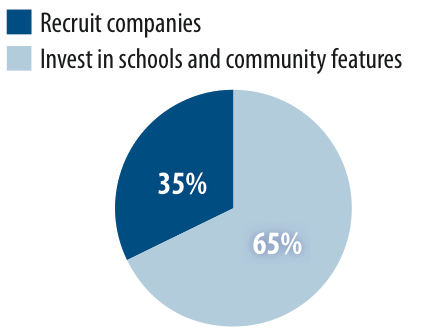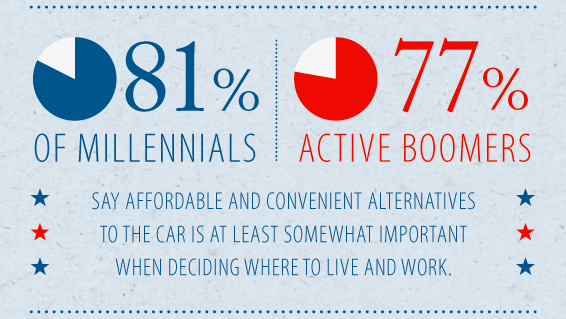When it comes to what Millennials and Baby Boomers look for in a community, the generation gap may be overstated.
According to a recent survey from the American Planning Association, young adults and their parents both want better transportation options. APA surveyed 1,040 adults ages 21 to 65 with at least two years of college. Of the respondents, 416 were between 21 and 34 years old (Millennials), and 416 were between 50 and 65 (Boomers).
Here are some of the key findings:
Both groups are pessimistic about the national economy and stressed about their personal finances.
Three in four Millennials and 65 percent of Boomers reported believing the national economy was "fundamentally flawed." Furthermore, neither group displayed much optimism that it would improve in the next five years. Both groups, however, were more optimistic about their local economies and personal prospects.
Both groups think community investment is more important than "traditional business recruitment strategies."
Instead of luring employers with tax breaks, 65 percent of respondents told APA they would prefer public investment in schools, transportation amenities, and other quality-of-life improvements. This was particularly true of Millennials -- three-quarters of whom responded this way.

APA calls this "the new economics of place" and suggests that responding to these preferences is an important and necessary shift in economic development strategy for local governments.
People want more transportation options besides driving, whether they live in the city or the suburbs.
A very small share -- 8 percent of Millennials and 7 percent of Boomers -- said they wanted to live in car-dependent sprawl in the future, even though 41 percent of Millennials and 39 percent of Boomers said they live in that type of community today. That doesn't necessarily mean they don't like living in the suburbs. APA said there was a demand for a range of living spaces -- from rural, urban, suburban and even small towns -- but that respondents indicated a desire for more transportation options, especially greater walkability.
Nearly 60 percent of both Millennials and Boomers said there weren't enough transportation options where they live. And about 80 percent of both demographic groups said convenient alternatives to driving were at least somewhat important to their residential choices.






